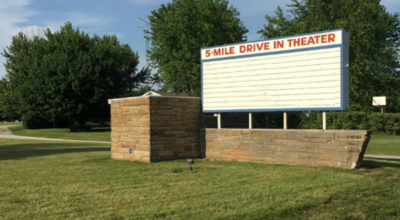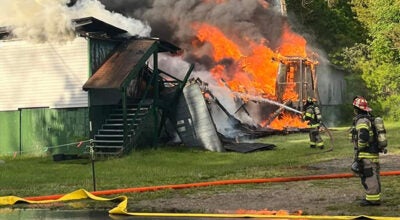Stories of recovery, resilience and redemption
Published 10:35 pm Monday, May 24, 2010

Cassopolis Family Clinic, a community health center providing medical care to residents of Cass and southeast Berrien County, Monday morning during Woodlands Behavioral Healthcare Network's second annual Mental Health Breakfast to fight stigma and to share recovery stories, the agency awarded the partner its community service award. Executive Director Mary Geegan Middleton, center, accepts the plaque from Woodlands Executive Director Kathy Boes, right, as Laura Murphy-Rizk, operations director, looks on at Dowagiac Elks Lodge 889. "Folks with a mental illness or developmental disability tend to have a mortality rate 20 years earlier than the general public," Boes said. "There are a multitude of factors which come into play, but that's pretty frightening. Often they have a lack of social support and medical insurance that could cover preventive health care. Sometimes they have been institutionalized and mistrust caregivers. The other component that impacts general health is medication. Over many years Cass Family Clinic has supported our consumers. They provide emergency care and preventive care. They're almost a support system for the individuals we serve." (The Daily News/John Eby)
By JOHN EBY
Dowagiac Daily News
Mental illness, a developmental disability or substance abuse do not mean the end of a quality life, Woodland Behavioral Healthcare Network Executive Director Kathy Boes told a capacity crowd Tuesday morning at the second annual Mental Health Breakfast at Dowagiac Elks Lodge 889.
“You don’t need to give up on life,” she said at the 2 1/2-hour event. “Recovery is possible. You can get your own apartment and live independently and no longer spend time in a hospital.”
Bob Weber, Woodlands’ case management supervisor, explained the evolution of recovery. He first came to the agency in 1994 and has been back since 2001.
Recovery, a word long associated with treatment for substance abuse and condition disorders, “in a nutshell, it’s a philosophy of how to live your life the best you can, with all your limitations and strengths, so you can be productive and healthy and have relationships.”
Over decades of addictions treatment, it was learned that success rates improved with lifestyle changes, including making healthier choices and steering clear of negative people and places they used to hang out.
“In recent years,” Weber said, “the state has mandated that Woodlands utilize the culture of recovery. it’s a wonderful fit for treatment. In the old system of treating individuals with developmental disabilities, disorders and mental health illnesses were based on a medical model. If you have a disorder or symptoms of an illness, you wanted to see an expert, like a psychiatrist or a psychologist for a diagnosis. There wasn’t a lot of emphasis on the positive aspects of moving beyond the diagnosis – and that’s what recovery is.”
Weber said, “With that change in philosophy, it de-emphasized the negative components of the limitations of the diagnosis. Now it’s, ‘You’re not defined by that diagnosis.’ You go out in the community, surround yourself with supportive people and make good choices. Be around others who suffer from the same types of things so you can learn from each other. There’s a lot of hope. You can have a career and relationships – all those things we all want. The scary diagnosis – autistic disorder, schizophrenia, bipolar disorder – that sounds like your life is ruined. It doesn’t have to be that way anymore. You can learn to cope, move beyond it and be productive. Recovery utilizes peer support services with individuals who have been in the system and been successful.”
SAMHSA, the federal Substance Abuse Mental Health Services Administration, defines recovery as a journey of healing and transformation enabling a person with a mental health problem to live a meaningful life in the community of his or her own choice while striving to achieve his or her own potential.
Clinical Director Rick Church explained the companion concept of resiliency.
“We’re all recovering from something – mental illness, substance abuse disorders, life trauma,” Church said.
“Resilience is bouncing back from what life gives you, whether it’s grief, loss, poor parenting, abuse and neglect, we all have stories. We’re talking about things that help us understand what’s going on, how we got to where we are, then to figure out a way to go forward despite the hurt and sometimes devastating histories we experience. They help us realize our potential and to become the persons we need to be.”
Church said in the next year Woodlands will be emphasizing resiliency not only as it pertains to adults, but children still developing coping skills.
“It’s critical that they have the tools necessary for resiliency,” he said. “Woodlands has an adolescent girls group, working with referrals from DHS (state Department of Human Services) and the court system. Resiliency skills are the pro-social aspects of living which help us overcome obstacles. Communication skills. Cognitive skills that help us reframe and get ahead. How to gain friendships. How to think differently about ourselves so we have better self-esteem because we know that how we think directly changes how we feel – just like how we feel determines, in part, how we’re going to act.”
Janelle, in her first year at Woodlands, was diagnosed with schizophrenia at 19, while a psychology major at the University of Nevada-Las Vegas.
“It was a terrible time for me. I lost a lot of things in my life,” she said. One of two girls, her mother is a registered nurse. Mental illness does not run in her family.
“They had a healthy daughter and me. I was given this diagnosis that I had to work through. My parents met a different person than I was. I became the disability. You lose friends, possessions and the safety from the identity of who you are. It’s been a long journey through counseling, medications, hospitalizations and stopping the suffering by trying to commit suicide.
“I attribute a lot to God. Dealing with the world is difficult enough, but dealing with the world with mental illness and trying to fit in is very difficult because they don’t see the person and how you’re dealing with it. I have my own apartment now and am very functional,” a college student with a better than B grade average.
“I have so many people working for me at Woodlands,” she said. “We really do appreciate what the case managers, therapists and doctors do for us. You help us through this journey to become the person we’re supposed to become. We can’t do these things and make our goals by ourselves. Everyone has obstacles to deal with to get to the next level of their life.”
Janine even joked, “I like to say that now at least I’ve got the voices taking turns … From my experience, I can help someone else get through it to a healing place.”
An audience that included state Reps. Matt Lori, R-Constantine, and John Proos, R-St. Joseph, and three Cass County commissioners, Robert Wagel, R-Wayne Township, Gordon Bickel, R-Porter Township, and Ed Goodman, R-Silver Creek Township, heard from one of the 700 trained peers in Michigan, of which Woodlands employs four.
On Dec. 22, 2008, she was on probation after giving birth to a son Nov. 27.
She tested positive for cocaine. Child Protective Services took her two kids, including the newborn, while she was incarcerated. She went through Family Treatment Court, including Woodlands substance abuse treatment. “I’m grateful” her children were returned in 10 months.
“Ruby hired me!” she exclaimed! still surprised.
“Who wants to hire a felon, a substance abuser and now I’m depressed because I didn’t have my kids back yet?” Now she’s studying social work at SMC. She applied for and surprised herself when she qualified for a scholarship because “I didn’t have that confidence. I’m so nervous. I’m grateful to Woodlands. Everything is good now.”
Hope’s issues started at 8 when she witnessed her brother’s death. “I really took a turn for the worst,” she said. “I gave my mom a lot of issues,” though her mother was seated next to her and embraced her daughter when she finished speaking. She gave birth to her first child, a daughter, at 19. In October 2006, Hope was scooped up in a drug raid which cost her the girl.
“I’m grateful it happened because I’ve accomplished a lot,” she said. “I had a relapse in 2008, but I’ve been clean and sober for a year and a half. It is a scary thing to deal with addiction. I deal with it every day. Sometimes I still want to do it. I can’t go back to that. I love my kids too much. I love my mom too much. I’m grateful for Woodlands helping me through everything I’ve been through.”
Ruby read a letter from Caroline, who was on a bus to Texas to see her children, “which highlights how important spirituality is for some people on their journey. We shouldn’t overlook spirituality as a part of the journey of recovery.”
Caroline wrote, “I just recently discovered that my mental abuse started when I was 8 years old. It got worse as a I got older. Over the years I’ve tried to kill myself a number of times. In 2003, I had a complete breakdown and was in a nursing home for 13 months. Five months of that year I was out of it. When I came out of it, I was so happy to be alive. I turned to God and started praying and thanking God for bringing me back. In 2008, I started reading my Bible every night. I am so blessed. I always thought I couldn’t be happy unless I had a man, but I love myself more each and every day. I finally have a positive outlook on life.”
Jacqueline, a bipolar former nurse at Madison Center in South Bend, Ind., remembers patients telling her, “I think you belong in here.”
During placements when she was younger, her sister would spring her, then reconsider because “I don’t think you’re right.”
Her adoptive family “was very dysfunctional.”
Once, reading Psalms while institutionalized, she vowed to God, “You will always have my brain, and the devil will never have my heart. I fought back and have been out of institutions for almost 30 years. Never let anyone tell you you’re having a ‘pity party.’ That means there’s something wrong and you need to talk. Woodlands is No. 1 to me.”
Tom Pabreza, a Woodlands case manager, read a testimonial from Victor, who could not be present due to Southwestern Michigan College classes.
“I’ve been here 14 years,” Pabreza said, “and the only reason I mention that is because when you stick around long enough, you get to see great things happen. Sometimes it’s a long, arduous journey, but if you stay with people and accompany them on their journey, I can’t tell you how fulfilling that is to see lives change.”
Victor arrived in this area in 1998 “a mess, battling mental illness and I didn’t even know it.”
After six months of his mother witnessing unusual behavior, she steered him to Woodlands. “She must have argued with me for a month before I realized I needed help.” Weber became his case manager.
“Not to throw out a lot of undeserved sunshine and rainbows, blow smoke or pull your chains, I’ve got to say Woodlands Behavioral Healthcare must employ one of the most competent collections of case managers. I’ve had nothing but good luck. They always treat me with the dignity and respect a person deserves. It’s been a long and grueling process, but after 12 years I can say I feel more complete and secure than ever. I owe a lot of credit to Woodlands for its work, ethics, compassion and determination to not let me slip through the cracks. As most of us know, the goal should be knowing how to live with your illness. A ‘cure’ is sometimes unrealistic. I have quality of life. I have a child on the way with my girlfriend. My supports, my family and friends, have seen me in the gutter and they’ve seen me shine. Through it all, I know they won’t let me down.”
Tracey, a 48-year-old paranoid schizophrenic, would agree. “My family life, I grew up abused, sexually, mentally, emotionally, physically, every way, shape and form,” she said. “There was a lot of alcoholism. Episodes started showing themselves when I was 22. I was scared that I would always hear these voices that never made any sense, that my thoughts would always pop around in my head and that I would never sleep. I grew up with, ‘You didn’t see psychiatrists, you didn’t get therapy and you didn’t take psych meds.’ Here I am in an institution with doctors telling me to take psych meds. As a result, the voices went away and I was released to go home, yet at the same time my own family made fun of me for having to get the therapy I needed because of them. I stopped drinking and quit using drugs, but the environment was still there.”
Tracey readily admitted she’s in Cass County for the quality of its mental health care. “In other states where I have lived, from Indiana to Texas, you get put on medication, sent to therapy and kicked to the curb. That doesn’t happen here. I’ve lost 16 family members in the last 10 years and I’ve not been deserted by Cass County, so I want to thank you. My life is much better.”
Alfred, grew up in Benton Harbor, where he was introduced to crack cocaine at 13 “hanging” with his older brother. He knew of only one user, 11, younger than himself. He can also recall a time before about fifth grade when he loved reading, math and singing. Music remains a passion.
“When it came time for me to read, I couldn’t concentrate,” he said, “so I would run away from school because I couldn’t focus,” which landed him in “multiple” foster homes and juvenile facilities, grooming him for prison stays that awaited.
Drugs were his portal to ” a new zombie world,” Al said. “I was with older people and it was real rough. God willing, I could write a book. I met one lady in particular who wasn’t like the rest of them. She told me I shouldn’t get high. You could tell she wasn’t from the streets. To me, she was like an angel. She’d buy me food and we’d sit and talk. One night, a guy I’d gotten high with, a wrestler, came on to me and wanted to do sexual things with me. That really scared me.”
He stayed clean of drugs from 14 until he married at 17, but he still had trouble studying. “Most of my trouble was hiding. I felt embarrassed and ashamed because I felt like I would never be able to read like others. No excuses.”
“Keep in mind, my childhood stopped at 13, so I brought that into my relationship. A big, jealous grown kid. I didn’t trust a lot and didn’t feel like you could be faithful because of how I came up. I wasn’t a good husband or father. I was a bad person, period, but I always had a good heart and prayed. I didn’t feel like I had the willpower to do what I needed to do. I had kids, but I ended up back on drugs after that marriage. I went to all types of prisons in different states. I got so close to being killed. I always felt they should understand that I didn’t mean bad, like committing a robbery with a fake gun. I did that. I didn’t want to shoot anybody,” like his role model in Elkhart, Ind. “I felt bad about it, but afterwards. I’m just thankful I’m here.”
He fathered three children in another off-and-on relationship with a woman “who takes me for what I am and lies to her mother that I went to college. I wanted to do things with my life. I’ve got brothers who did great in Iraq. Two years ago, with Denise getting tired of my crap – we’ve separated multiple times – I don’t know why that strong lady stuck with me. I had these beautiful little kids I ran out of my life. I took 70 to 80 pills. I was ready to die. I woke up three days later” to Church’s smiling face.
“I’ve been to multiple hospitals,” including the Kalamazoo psychiatric facility, “but (Woodlands) asked what they could do to help me. He gave me the chance. I went to Penn Friends Church and all the things Woodlands offered me. Recovery is the way to go. If it could work for me, it could work for anybody. You need to keep Woodlands around and support them.”
Trembling, Julie, of Dowagiac, said, “I wouldn’t be standing here today if it wasn’t for you guys. I don’t know where I would have been if they had not come to my house,” because she suffered from agoraphobia, the anxiety disorder thought to involve a fear of public places.
“I was a mess. My son, 8, was a mess. I threatened to give him away. I can’t believe I’m standing here, and I do have a girl’s shirt on. I’ve been in and out of drugs. I’ve done all that. I’m bipolar, but I do go out in public now, although this is crazy.”
Weber read Mandy’s story. She is 34 and has had two mental illness diagnoses.
“Growing up in a dysfunctional home was far from fun. Having mental illnesses since I was 12 was also very hard. My parents divorced when I was 16. That was a very good thing. At about 18, I started self-medicating myself with drugs and alcohol. I was also anorexic and bulimic, which almost led me to end my own life. My family moved me home and in with them. Slowly, I began to get better.”
Mandy started at Woodlands in 2003. “It helped me immensely.”
In 2005, when her children were 3 and 9, she became so sick she entered Kalamazoo psychiatric hospital – “hell on earth. Having to be restrained and heavily medicated for 2 1/2 months every evening, I was told. I don’t remember any of that part. Finally coming to reality while being hauled off to the seclusion room to be restrained and drugged. After coming to my senses, I was much better, but still had panic attacks. They soon faded, so I was released to the Woodlands RTC (residential treatment center) for two weeks.”
Eventually, she separated from her husband. She averaged a trip a year to Madison Center. Today, “I’m doing great, my children and me. I’m doing so well that I’m going to ask my doctor if I can discontinue one of my medicines. I’m still in therapy and go once a week to a group class for borderline personality disorders. I’m learning new skills, like how to deal with my emotions effectively and have effective relations. Thanks to all who helped me get better along the way. I try to make every day my best.”
Another letter was written by a mother about her son, Peter, afflicted by mental retardation, bipolar and ADHD.
“Peter needed a lot of help outside the home to maintain his current residence” in supported independent living, where he cooks and does laundry in an apartment setting.
“Our family is blessed with people stepping up to the plate for us,” from Woodlands to Wraparound. “Peter is an amazing self-sufficient person. Woodlands is very much needed.”
Terry traced his problems back to school peer conflicts in another state before “programs like we’ve got now. Michigan was like a whole new world to me. I spoke at the State Capitol rally, making me feel like my voice was being heard and counted for something.
“I dealt with a whole lot of doubts, lack of self-esteem, symptoms that go with anxiety and depression. I tried numerous times to commit suicide because I didn’t know where I fit in life or if I had a purpose.”
“It’s a wonderful opportunity for me as a social worker to hear positive stories,” Boes said. “May is Mental Health Month. It’s very scary to do public speaking, let alone to share your personal story of recovery.”






